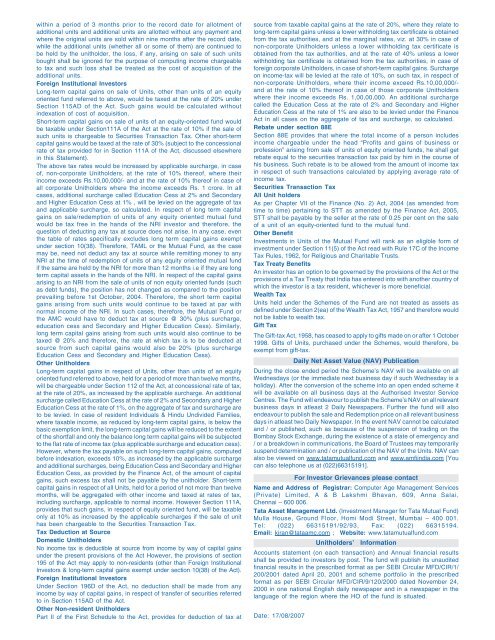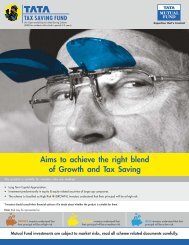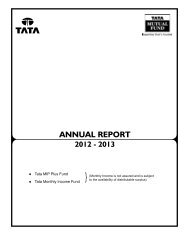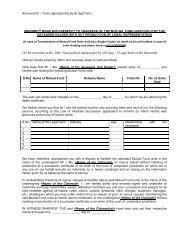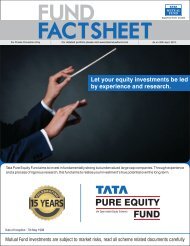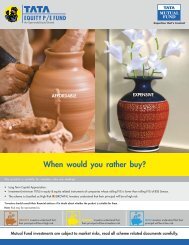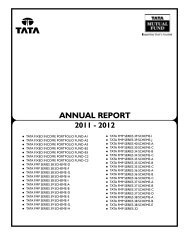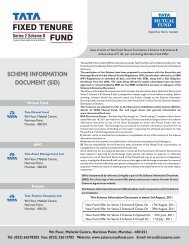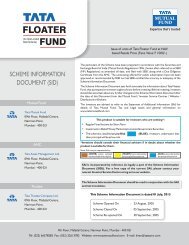KIM & OD COVER - Tata Mutual Fund
KIM & OD COVER - Tata Mutual Fund
KIM & OD COVER - Tata Mutual Fund
Create successful ePaper yourself
Turn your PDF publications into a flip-book with our unique Google optimized e-Paper software.
within a period of 3 months prior to the record date for allotment of<br />
additional units and additional units are allotted without any payment and<br />
where the original units are sold within nine months after the record date,<br />
while the additional units (whether all or some of them) are continued to<br />
be held by the unitholder, the loss, if any, arising on sale of such units<br />
bought shall be ignored for the purpose of computing income chargeable<br />
to tax and such loss shall be treated as the cost of acquisition of the<br />
additional units.<br />
Foreign Institutional Investors<br />
Long-term capital gains on sale of Units, other than units of an equity<br />
oriented fund referred to above, would be taxed at the rate of 20% under<br />
Section 115AD of the Act. Such gains would be calculated without<br />
indexation of cost of acquisition.<br />
Short-term capital gains on sale of units of an equity-oriented fund would<br />
be taxable under Section111A of the Act at the rate of 10% if the sale of<br />
such units is chargeable to Securities Transaction Tax. Other short-term<br />
capital gains would be taxed at the rate of 30% (subject to the concessional<br />
rate of tax provided for in Section 111A of the Act, discussed elsewhere<br />
in this Statement).<br />
The above tax rates would be increased by applicable surcharge, in case<br />
of, non-corporate Unitholders, at the rate of 10% thereof, where their<br />
income exceeds Rs.10,00,000/- and at the rate of 10% thereof in case of<br />
all corporate Unitholders where the income exceeds Rs. 1 crore. In all<br />
cases, additional surcharge called Education Cess at 2% and Secondary<br />
and Higher Education Cess at 1% , will be levied on the aggregate of tax<br />
and applicable surcharge, so calculated. In respect of long term capital<br />
gains on sale/redemption of units of any equity oriented mutual fund<br />
would be tax free in the hands of the NRI investor and therefore, the<br />
question of deducting any tax at source does not arise. In any case, even<br />
the table of rates specifically excludes long term capital gains exempt<br />
under section 10(38). Therefore, TAML or the <strong>Mutual</strong> <strong>Fund</strong>, as the case<br />
may be, need not deduct any tax at source while remitting money to any<br />
NRI at the time of redemption of units of any equity oriented mutual fund<br />
if the same are held by the NRI for more than 12 months i.e if they are long<br />
term capital assets in the hands of the NRI. In respect of the capital gains<br />
arising to an NRI from the sale of units of non equity oriented funds (such<br />
as debt funds), the position has not changed as compared to the position<br />
prevailing before 1st October, 2004. Therefore, the short term capital<br />
gains arising from such units would continue to be taxed at par with<br />
normal income of the NRI. In such cases, therefore, the <strong>Mutual</strong> <strong>Fund</strong> or<br />
the AMC would have to deduct tax at source @ 30% (plus surcharge,<br />
education cess and Secondary and Higher Education Cess). Similarly,<br />
long term capital gains arising from such units would also continue to be<br />
taxed @ 20% and therefore, the rate at which tax is to be deducted at<br />
source from such capital gains would also be 20% (plus surcharge<br />
Education Cess and Secondary and Higher Education Cess).<br />
Other Unitholders<br />
Long-term capital gains in respect of Units, other than units of an equity<br />
oriented fund referred to above, held for a period of more than twelve months,<br />
will be chargeable under Section 112 of the Act, at concessional rate of tax,<br />
at the rate of 20%, as increased by the applicable surcharge. An additional<br />
surcharge called Education Cess at the rate of 2% and Secondary and Higher<br />
Education Cess at the rate of 1%, on the aggregate of tax and surcharge are<br />
to be levied. In case of resident Individuals & Hindu Undivided Families,<br />
where taxable income, as reduced by long-term capital gains, is below the<br />
basic exemption limit, the long-term capital gains will be reduced to the extent<br />
of the shortfall and only the balance long term capital gains will be subjected<br />
to the flat rate of income tax (plus applicable surcharge and education cess).<br />
However, where the tax payable on such long-term capital gains, computed<br />
before indexation, exceeds 10%, as increased by the applicable surcharge<br />
and additional surcharges, being Education Cess and Secondary and Higher<br />
Education Cess, as provided by the Finance Act, of the amount of capital<br />
gains, such excess tax shall not be payable by the unitholder. Short-term<br />
capital gains in respect of all Units, held for a period of not more than twelve<br />
months, will be aggregated with other income and taxed at rates of tax,<br />
including surcharge, applicable to normal income. However Section 111A,<br />
provides that such gains, in respect of equity oriented fund, will be taxable<br />
only at 10% as increased by the applicable surcharges if the sale of unit<br />
has been chargeable to the Securities Transaction Tax.<br />
Tax Deduction at Source<br />
Domestic Unitholders<br />
No income tax is deductible at source from income by way of capital gains<br />
under the present provisions of the Act However, the provisions of section<br />
195 of the Act may apply to non-residents (other than Foreign Institutional<br />
Investors & long-term capital gains exempt under section 10(38) of the Act).<br />
Foreign Institutional Investors<br />
Under Section 196D of the Act, no deduction shall be made from any<br />
income by way of capital gains, in respect of transfer of securities referred<br />
to in Section 115AD of the Act.<br />
Other Non-resident Unitholders<br />
Part II of the First Schedule to the Act, provides for deduction of tax at<br />
source from taxable capital gains at the rate of 20%, where they relate to<br />
long-term capital gains unless a lower withholding tax certificate is obtained<br />
from the tax authorities, and at the marginal rates, viz. at 30% in case of<br />
non-corporate Unitholders unless a lower withholding tax certificate is<br />
obtained from the tax authorities, and at the rate of 40% unless a lower<br />
withholding tax certificate is obtained from the tax authorities, in case of<br />
foreign corporate Unitholders, in case of short-term capital gains. Surcharge<br />
on income-tax will be levied at the rate of 10%, on such tax, in respect of<br />
non-corporate Unitholders, where their income exceed Rs.10,00,000/-<br />
and at the rate of 10% thereof in case of those corporate Unitholders<br />
where their income exceeds Rs. 1,00,00,000. An additional surcharge<br />
called the Education Cess at the rate of 2% and Secondary and Higher<br />
Education Cess at the rate of 1% are also to be levied under the Finance<br />
Act in all cases on the aggregate of tax and surcharge, so calculated.<br />
Rebate under section 88E<br />
Section 88E provides that where the total income of a person includes<br />
income chargeable under the head “Profits and gains of business or<br />
profession” arising from sale of units of equity oriented funds, he shall get<br />
rebate equal to the securities transaction tax paid by him in the course of<br />
his business. Such rebate is to be allowed from the amount of income tax<br />
in respect of such transactions calculated by applying average rate of<br />
income tax.<br />
Securities Transaction Tax<br />
All Unit holders<br />
As per Chapter VII of the Finance (No. 2) Act, 2004 (as amended from<br />
time to time) pertaining to STT as amended by the Finance Act, 2005,<br />
STT shall be payable by the seller at the rate of 0.25 per cent on the sale<br />
of a unit of an equity-oriented fund to the mutual fund.<br />
Other Benefit<br />
Investments in Units of the <strong>Mutual</strong> <strong>Fund</strong> will rank as an eligible form of<br />
investment under Section 11(5) of the Act read with Rule 17C of the Income<br />
Tax Rules, 1962, for Religious and Charitable Trusts.<br />
Tax Treaty Benefits<br />
An investor has an option to be governed by the provisions of the Act or the<br />
provisions of a Tax Treaty that India has entered into with another country of<br />
which the investor is a tax resident, whichever is more beneficial.<br />
Wealth Tax<br />
Units held under the Schemes of the <strong>Fund</strong> are not treated as assets as<br />
defined under Section 2(ea) of the Wealth Tax Act, 1957 and therefore would<br />
not be liable to wealth tax.<br />
Gift Tax<br />
The Gift-tax Act, 1958, has ceased to apply to gifts made on or after 1 October<br />
1998. Gifts of Units, purchased under the Schemes, would therefore, be<br />
exempt from gift-tax.<br />
Daily Net Asset Value (NAV) Publication<br />
During the close ended period the Scheme’s NAV will be available on all<br />
Wednesdays (or the immediate next business day if such Wednesday is a<br />
holiday). After the conversion of the scheme into an open ended scheme it<br />
will be available on all business days at the Authorised Investor Service<br />
Centres. The <strong>Fund</strong> will endeavour to publish the Scheme’s NAV on all relevant<br />
business days in atleast 2 Daily Newspapers. Further the fund will also<br />
endeavour to publish the sale and Redemption price on all relevant business<br />
days in atleast two Daily Newspaper. In the event NAV cannot be calculated<br />
and / or published, such as because of the suspension of trading on the<br />
Bombay Stock Exchange, during the existence of a state of emergency and<br />
/ or a breakdown in communications, the Board of Trustees may temporarily<br />
suspend determination and / or publication of the NAV of the Units. NAV can<br />
also be viewed on www.tatamutualfund.com and www.amfiindia.com [You<br />
can also telephone us at (022)66315191].<br />
For Investor Grievances please contact<br />
Name and Address of Registrar: Computer Age Management Services<br />
(Private) Limited, A & B Lakshmi Bhavan, 609, Anna Salai,<br />
Chennai – 600 006.<br />
<strong>Tata</strong> Asset Management Ltd. (Investment Manager for <strong>Tata</strong> <strong>Mutual</strong> <strong>Fund</strong>)<br />
Mulla House, Ground Floor, Homi Modi Street, Mumbai – 400 001.<br />
Tel: (022) 66315191/92/93, Fax: (022) 66315194.<br />
Email: kiran@tataamc.com ; Website: www.tatamutualfund.com<br />
Unitholders’ Information<br />
Accounts statement (on each transaction) and Annual financial results<br />
shall be provided to investors by post. The fund will publish its unaudited<br />
financial results in the prescribed format as per SEBI Circular MFD/CIR/1/<br />
200/2001 dated April 20, 2001 and scheme portfolio in the prescribed<br />
format as per SEBI Circular MFD/CIR/9/120/2000 dated November 24,<br />
2000 in one national English daily newspaper and in a newspaper in the<br />
language of the region where the HO of the fund is situated.<br />
Date: 17/08/2007


